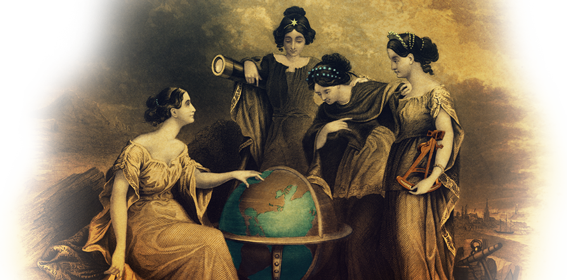Coda
“There is one point of great delicacy in unfolding the events of history to the young mind; namely, that a large portion of the actions of men, as related by the historian, are evil. As you lift the curtain of the past, mankind seem from age to age engaged in constant strife, battle, and bloodshed; the master-spirits generally stand forth as guided only by ambition, and superior to other men in wickedness as in power. To reveal these dark pictures to youth, and yet prevent the bright and sunny landscape of the heart from being permanently sullied or shadowed by the acquisition of such knowledge, demands great care, and I hope I have not been insensible of the responsibility of my task in this respect. It is necessary that history should be known, that we may learn the character and capacity of man; but in telling of the vices and crimes that soil the pages of the past, I have taken advantage of every convenient occasion, to excite hatred of injustice, violence, and falsehood, and promote a love of truth, equity, and benevolence.” — Goodrich, Samuel G. Peter Parley’s Universal History, on the Basis of Geography. Boston: American Stationers’ Company; John B. Russell, 1837. p. 1:viii.
Nathaniel Hawthorne wrote these words. He did so in a year he hoped to become famous by collecting his anonymously published short stories together into a book under his own name. To Hawthorne’s disappointment Twice-Told Tales did not sell well — perhaps because 1837 saw a nationwide economic downturn — but scholars now credit the book with helping inaugurate an “American Renaissance” of serious literature. Hawthorne did become famous, later.
But Hawthorne wrote these words — pondering the ethics of teaching an honest version of history to “young readers” — when he was a hack writer for the publisher Samuel Goodrich. Financially insecure into his thirties, Hawthorne earned some meager income by editing Goodrich’s nationalist popular magazine and by penning a family-friendly history book for Goodrich. He undertook both tasks with more distaste than care, the lackluster result of which did nothing to undermine the growing popularity of Goodrich’s publishing empire.
While Peter Parley’s Universal History was derivative and superficial, Hawthorne’s stern disposition managed to seep into the book’s preface. He insisted that American youth must not be sheltered from the darkness of human history, if they were to learn due moral decency. Everywhere else in the book Hawthorne wrote from a stance of ready-made national exceptionalism, but in this brief moment he intoned in the solemn voice of the human condition.
National exceptionalism was the usual starting point in popular history and geography books marketed to middle-class families between the American Revolution and the American Civil War. The wider world served mainly as a foil for self-congratulatory cultural comparison, not as a theater of global interconnection. None of the 170 books Samuel Goodrich published in his career — numerous world histories among them — helped Americans to seriously comprehend the energies of the world beyond their intersection with it. Globalization was to a degree happening, from American initiative and otherwise, but middle-class American families would have to discover the realities of the world from other sources.
This exhibit has spotlighted some of those sources, books meant to inspire American interest, ambition, and enterprise in the world. If Hawthorne’s message was the cruelty in human history, this exhibit’s lesson has been the sheer difficulty that the United States faced in striving to extend its reach into the world in the first half of the nineteenth century. The outcome by the time of the American Civil War was an ambitious young global empire capable of projecting some degree of “hard” and “soft” power around the world, while both emulating the British empire and presenting itself as a supposedly gentler alternative.
Imagining that, pursuing that, and enacting that all took hard and ugly work, most of which was motivated by aims well short of either empire or globalization. American empire and the United States' contribution to globalization were, in the first half of the nineteenth century, made out of something else: something smaller accumulating into something larger.


